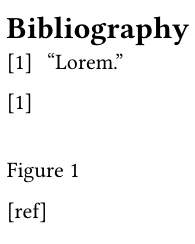When citing a reference whose label is missing, Typst throws an error:
As noted previously @foo-2025, ...
yields:
error: label <foo-2025> does not exist in the document
which forces us to stop writing and go hunt down the relevant bibliographic details.
In LaTeX, missing references are simply displayed in loud, visible markup such as:
"As noted previously [foo-2025], … ".
Is there a way to have Typst emit simple warnings for missing references without throwing us out of the flow of writing?
There is an issue on GitHub about downgrading missing references to warnings. I think this is the place where you can find the most information regarding your question. Since the issue is still open and the discussion is ongoing, I’m afraid there is no way to currently suppress the errors there is no official solution yet. See the answer by @quachpas below for a workaround.
It’s a little verbose, but you can just replace labels that don’t exist.
#show ref: it => {
if query(it.target).len() == 0 {
"[" + str(it.target) + "]"
} else {
it
}
}
#figure[] <label>
@label
@ref

2 Likes
Unfortunately, the solution of @quachpas breaks citations to the bibliography (because the query inevitably fails to find the citation label in the typst document). If one could test whether a link can be found in the .bib file or not, then the solution of @quachpas could be improved.
Does someone know a way to do this?
1 Like
Due to the way cite references work, there is no way to distinguish between a bibliographic reference or a nonexisting ref. See below, lorem being a reference to a bibliographic item.
ref(
target: <lorem>,
supplement: auto,
form: "normal",
citation: cite(key: <lorem>, supplement: none),
element: none,
)
ref(
target: <ref>,
supplement: auto,
form: "normal",
citation: cite(key: <ref>, supplement: none),
element: none,
)
Instead, you can adapt your show rule to read the bibliography file and compare the keys to the label target. That’s doable with simple parsing (as long as your file is formatted with the @ and the key on the same line).
#bibliography("test.bib")
#show ref: it => {
let bibfile = read("test.bib")
let entries = bibfile.split("@")
entries.remove(0) // ""
let keys = for entry in entries {
(entry.slice(entry.position("{")+1, entry.position(",")),)
}
if str(it.target) not in keys and query(it.target).len() == 0 {
"[" + str(it.target) + "]"
} else {
it
}
}

2 Likes
Just here to point out that there is a bug in the code provided by @quachpas, since it forces a line break at each ref. The reason is that entries.remove(0) returns the removed value, which then gets added to the content. To solve, instead of:
entries.remove(0) // ""
Write:
let _ = entries.remove(0) // ""
Edit: after a couple of experiments, this happens because my bib file starts with a blank line, so the first entry is “\r\n” and not “”. Anyway, my fix ensures that everything before the first entry is discarded, otherwise a bib like:
% mycomment
@article{myarticle,
author = {me},
}
Would add “% mycomment” to all references
1 Like

